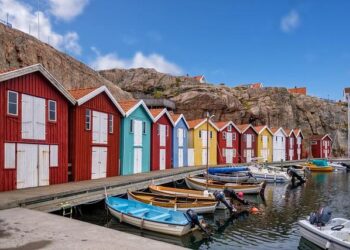Vucic’s Moscow Visit: A Bold Diplomatic Statement Challenging EU Dynamics
In a striking diplomatic maneuver, Serbian President Aleksandar Vucic made headlines this week with his visit to Moscow, signaling a important stance amid the escalating tensions between the European Union and Russia. As the EU grapples with its geopolitical strategies and aims to unify its member states against perceived threats from the east, Vucic’s trip underscores Serbia’s complex relationships with both Western nations and its traditional Slavic ally.This visit is seen not only as an affirmation of Serbia’s foreign policy independence but also as a strategic challenge to EU influence in the Balkans. With Serbia currently in negotiations for EU membership and facing pressure to align more closely with European standards, this diplomatic gesture could deepen existing rifts and spark further discussions about the region’s strategic trajectory.
Vucic’s Moscow Visit: A Challenge to EU Influence
Serbian President Aleksandar VuÄŤić’s recent journey to Moscow has drawn considerable attention across Europe,appearing almost defiant towards the European Union. This engagement is far from ordinary; it reflects Serbia’s delicate balancing act between Eastern alliances and aspirations for Western integration. VuÄŤić’s meetings with Russian officials highlight his administration’s commitment to maintaining strong ties with Moscow even as Belgrade experiences waning support from Brussels. Analysts suggest that VuÄŤić is strategically leveraging this relationship to assert Serbia’s autonomy on the global stage amidst increasing pressure from the EU for alignment with Western policies.
During his discussions in Moscow focused on economic cooperation and regional security, several key implications emerged:
- Rejection of Western Expectations: By strengthening ties with Russia, Serbia sends a clear signal of resistance against demands from Brussels.
- Energy Dependence: The nation remains significantly reliant on Russian energy resources, complicating efforts by the EU aimed at promoting diversification.
- Navigating Domestic Politics: Vučić’s actions resonate positively among nationalist groups within Serbia, bolstering his political support base.
Strategic Analysis: Understanding Serbia’s Diplomatic Alignments
This recent display of diplomacy by Serbian President Aleksandar Vučić reverberates throughout Europe at a time when Belgrade seeks closer ties with the European Union while concurrently engaging openly with Russia. Observers are closely monitoring how this pivot might affect Belgrade’s negotiation strategy regarding potential membership in the bloc—especially as Europe struggles to formulate a unified response to Russian actions in Ukraine.
The ramifications stemming from this visit illustrate how carefully balanced Serbia must tread:
- Evolving Energy Security: Increased reliance on Russian energy could grant greater leverage over Serbian affairs by Russia.
- Moscow’s Geopolitical Clout: Support from Russia may embolden Belgrade towards adopting a more assertive foreign policy that challenges established norms set by the EU.
- Nurturing National Sentiment: Actions taken by Vučić could amplify nationalist sentiments among constituents favoring closer relations with Russia—further complicating integration efforts into Western institutions.
A extensive understanding of these dynamics can be gained through examining various diplomatic alignments involving Serbia outlined below:
| Status of Alignment | |||
|---|---|---|---|
| The European Union | Candidacy for Membership Status | ||
| The Russian Federation | Established Strategic Partnership | ||
| The People’s Republic of China | Evolving Economic Relationships |
EU Strategies: Enhancing Engagement in Balkan Affairs
The shifting geopolitical landscape within Southeast Europe necessitates that the European Union reassess its strategies moving forward.The recent engagement between President Aleksandar VuÄŤić and officials in Moscow not only highlights enduring connections between Belgrade and Moscow but also exposes weaknesses within Europe’s approach toward its partners in Southeast Europe. To effectively counteract growing Russian influence,it is indeed indeed imperative for Brussels to consider implementing several key initiatives:
- Create Economic Partnerships: Launch investment programs aimed at infrastructure development, renewable energy projects and job creation initiatives to bolster economic resilience across Balkan nations.
- Foster Political Dialog: Organize regular high-level meetings focused on shared challenges ensuring continued relevance within local political landscapes.< b/>
- Support Civil Society Initiatives: Empower local NGOs through funding opportunities fostering democratic stability throughout communities.< b/>
- < b >Combat Misinformation:< b/> Develop targeted campaigns addressing disinformation tactics designed specifically aimed at creating division amongst Balkan states.< / li >
p>A reconsideration regarding integration processes tailored specifically towards western Balkan countries would cultivate stronger feelings belonging alongside security assurances amongst these nations . A clear timeline outlining membership negotiations coupled tangible milestones progress would greatly benefit regional stability . Moreover exploring potentialjoint security collaborationscould enhance overall safety creating frameworks inclusive both members state along fostering cooperation neighboring countries . Below table outlines possible areas focus these initiatives :< / p >
Proposed Initiative Description < td >Economic Development Fund < td />Track funding local projects aimed boosting economic growth .< tr /> < td >Cross-Border Security Collaborations < td />Joint training programs law enforcement emergency responders .< tr /> < td>Cultural Exchange Programs < td />Promote understanding educational cultural initiatives .< tr /> In conclusion , President Aleksandar Vuci ć ‘ s recent journey into moscow serves not just highlight serbia ‘ s complex geopolitical positioning but also acts provocative reminder delicate balance maintained regional alliances versus european integration efforts . As vuci ć engages russia amidst ongoing eu accession talks , ramifications arising raise critical inquiries surrounding serbian strategic direction relationships both western eastern powers alike .
The eu ‘ s response maneuverings will undergo intense scrutiny while serbia continues navigate path rapidly evolving political environment ; what remains evident vući ć ’s actions transcend mere symbolism they illuminate intricate dance diplomacy characterizing role global stage compelling eu member states reassess approaches pivotal balkans nation .
ADVERTISEMENT - Support Civil Society Initiatives: Empower local NGOs through funding opportunities fostering democratic stability throughout communities.< b/>















